
People make choices every minute. They can choose to be positive or negative, to be creators or complainers, to take responsibility or avoid responsibility.
Viktor Frankl believed people can choose their attitude any situation. Here is how he described this approach in Man’s Search For Meaning:

Looking back at your own life, can you think of a time when you chose your attitude? You may have been recovering from a setback, tackling an illness, finding a solution to a challenge or whatever.
At first you may have felt down, but then you chose to shape your future. What did you do right then? What were the principles you followed? How can you follow these principles in the future?
If you wish try tackling the exercise on this theme. This invites you to do the following things.
Describe a specific situation in the past when you chose your attitude.
Describe the specific things you did to choose your attitude in that situation and then translate it into action.
Describe the specific benefits of choosing your attitude in that situation.
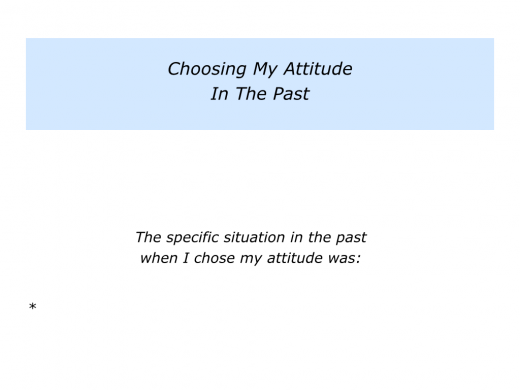
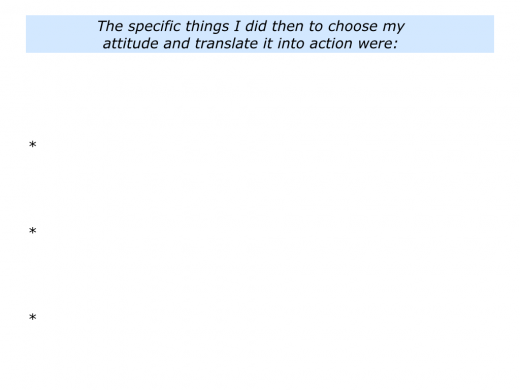
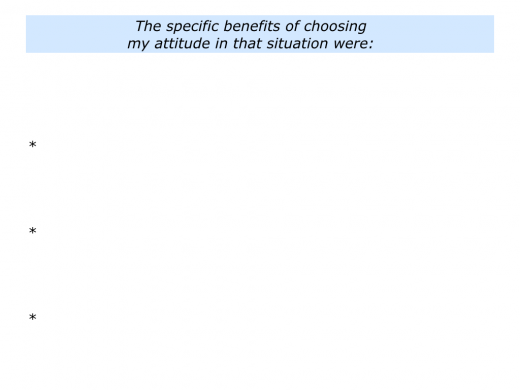
Sue – Choosing To
Shape Her Future
During my early career I ran therapeutic communities. The young people who came had all encountered setbacks.
They each had the opportunity to choose how to shape their futures. Here is the story of one person who chose to take the positive route.
Sue Carter came to the community in 1970. She was abandoned by her mother at the age of two and had grown-up being abused in institutions.
Arriving at the community, Sue recognised she was at a crossroads and began pursuing her chosen route. Putting her troubles behind her, she aimed to do one thing in life – to be a good parent.
Thirty years later, quite out of the blue, she emailed me to describe her journey over the past three decades. Now a proud grandparent, she had enjoyed a fulfilling life.
Sue was always feisty. This was exemplified during a visit from the Essex police who were investigating events at the children’s homes. They asked if she was a victim of abuse. Sue exclaimed:
No I am a SURVIVOR of abuse.
Sue describes below the route she chose to follow before coming to our community and then afterwards. She wrote:
One day I found myself in a cell that was famous for holding a girl who had killed a child.
Things looked bad, but then I got the chance to go to a community where young people had the opportunity to change their lives.
Over 30 years later I now have three sons and a wonderful granddaughter, who is the apple of my eye. The times in-between have sometimes been difficult, but never dull.
During my twenties I had several long relationships and eventually got married. Unfortunately my husband tried to control me, so end of marriage.
My greatest fear as a parent was that my kids could end up in care. So I then decided to be the best single parent I could be. I stayed on my own with the boys for the next 18 years.
Then I met a good man with whom I had a child. Even though the man and I have now parted, we are still good friends and he is a good father.
Looking back at the therapeutic community, sometimes we had fantastic talks.
There would be 8 of us sitting in a bedroom till midnight, just sharing thoughts we had never discussed with anybody before. Every young person in the community had suffered problems.
We encouraged each other to talk about the past, but didn’t allow each other to use it as an excuse for behaving badly.
If I said, ‘My mother left me in the park when I was two,’ somebody else said: ‘I can top that. How can you use that bad experience to help others in the future?’
Nowadays I try to help other people by volunteering to work at the local hospice. But the thing I am most proud of is being a good parent to my children.
Choosing Our Attitude
When Facing Challenges
Al Siebert devoted much of his life to studying survivors who had thrived by choosing their attitude. He studied people that met four criteria:
They had survived a major crisis.
They had surmounted the crisis through personal effort.
They had emerged from the experience with previously unknown strengths and abilities.
They had, in retrospect, found value in the experience.

Al outlined some of the strategies survivors adopt to overcome crises successfully. These include the following.
They quickly read the new reality.
Survivors have experience of overcoming difficulties in life. As a result, they have developed a particular kind of savvy or personal radar.
Other people ignore what is happening or bury their heads in the sand. Survivors click into awareness mode and take snapshots of what is actually happening.
They stay calm.
Al gives examples of hijack survivors who stay calm. They gather information about how the hijackers behave, look for patterns and explore potential exits – not only for themselves, but also for other people.
They maintain a sense of perspective.
People who are diagnosed with a serious illness, for example, often aim to build on the assets.
They focus on their relationships, knowledge, talents and the healthy parts of their body. Mobilising these strengths, they then tackle the challenge.
They are open to doing anything.
Al found that survivors choose their strategies from a wide repertoire of options.
One contributing factor is that they have a quality common to many peak performers. Such people embrace what appear to be paradoxes.
They are able to see the big picture and the small details, to be focused and flexible, to be serious and playful.
This means they are able to see a wider number of options than, for example, people who have been trained to behave in one way.
They have life-competence that helps them in emergencies.
Survivors love to explore and make sense of experiences. They prefer to take initiatives, rather than become institutionalised.
Such people tend to be savvy, rather than having lived a sheltered life. This enables them to read situations, call on their experience and make decisions.
Moving into action, they observe what is happening – what is working and what isn’t – and are prepared to change direction. This is a great advantage when tackling problems or emergencies.
They totally commit to doing their best.
Survivors make their decision and then throw themselves into pursuing their chosen strategy. They employ every ounce of energy to reach the goal.
Looking to the future, can you think of a situation where you may need to choose your attitude? You may need to take care of your health, develop your career, manage your money, find a new sense of purpose or whatever.
When might this event happen? If you wish, what can you do to choose your attitude in that situation? How can you then translate your choice into action? What will be the benefits of following through on your decision?
People make choices all the time. They can choose to be positive or negative, to be a creator or a complainer, to take responsibility or avoid responsibility. Each choice does, of course, have consequences.
If you wish try tackling the exercise on this theme. This invites you to do the following things.
Describe a specific situation in the future where you may want to choose your attitude.
Describe the specific things you can do to choose your attitude in that situation and then translate it into action.
Describe the specific benefits of choosing your attitude in that situation.
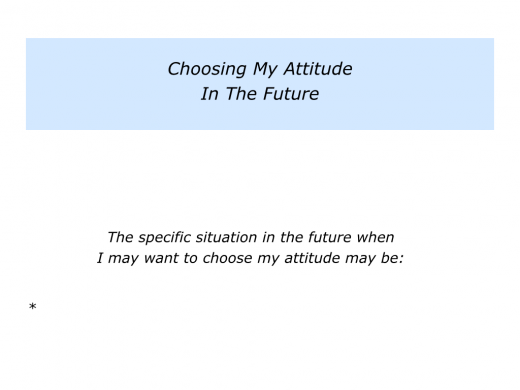
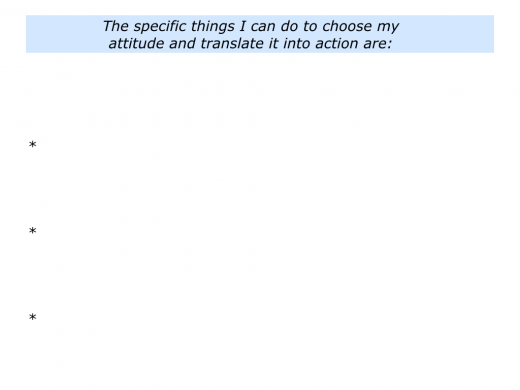
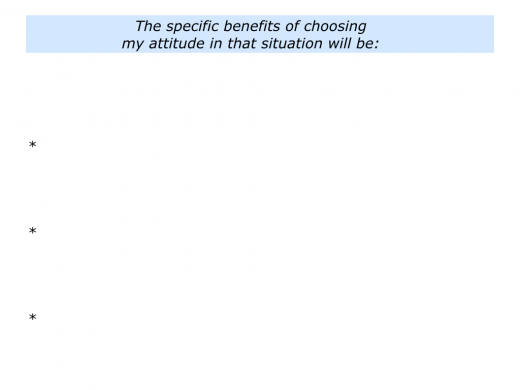






Leave a Reply